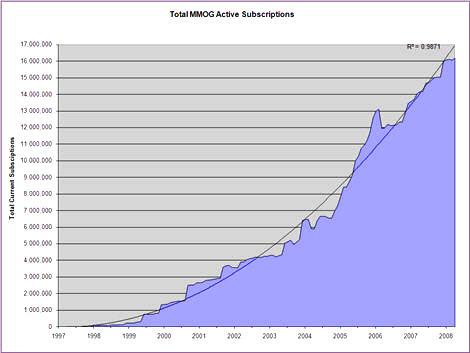Apologies if this subject has been done to death, but I realize that while it's generally accepted that cRPGs (and, arguably, gaming as a whole) went into a decline starting in the early 2000s, I don't have a very firm understanding of what caused it to happen and what is ultimately driving the recent promise of a turnaround.
Decline in what sense?
What Codex calls decline, the suits call expansion. CRPGs did take a nose dive in the early 2000s, but that was when MMORPGs were literally exploding in popularity. Everquest was released in 1999 and experienced year-by-year player base expansion till its peak around 800,000 players in 2004, when WoW released and became the biggest MMORPG of all time, growing upwards to 10.5+ million subscriptions in the late 2000s. This MMO fad was in turn surpassed by the even larger explosion of MOBA games in the last 5-6 years. Between League of Legends and Dota 2, they've now captured upwards of a 80+ million players market - completely unthinkable in the late 1990s.
At the same time, you had the concurrent expansion of the EA sports franchise, Call of Duty, GTA, and all the mainstream games that Codex loves to hate, each boasting tens of millions of sales each year. It's not though the games industry crashed around this time. No, the games industry exploded during this time. Revenues quadrupled from 1997 to 2008. It was not till the advent of online distribution and free-to-play business models in the late 2000s that retail sales began to fall. But in fact, revenues
are still increasing, just not in the same areas:
It's fine to talk about games being dumbed down for the masses, but were that the only active force, we'd see dumbed down CRPGs at the top of the sales charts, but we don't. The Mass Effect games only sold about 3-4 million units, on average. Same with Oblivion, and even worse with Witcher and DA. Except for Besthesda's Skyrim and Blizzard's Diablo 3, no CRPG game has managed to break the 5 million units mark for a decade. The decline in CRPGs is thus fundamentally different from the 'decline' of the games industry. It's also a stretch to call a modern FPS eg Call of Duty a 'dumbed down' version of Doom, Quake, etc.
To this end, I'd rather see the decline of CRPGs as the trials and tribulations of a very specific group of developers, rather than the fault of the industry at large. Because when it comes down to it, the decline of CRPGs - in the Codex sense - primarily has to do with the decline/demise of three studios: Interplay, Bioware, and Troika, who were responsible for the late 90s CRPG boom that brought the Codex - along with the bulk of the other 'old school CRPG' sites - into existence, and it's their style of games - rather, an idealized version - that is held up as the holy grail of CRPGs. The Codex, despite its edginess, is still at its core a community of BIS, Bioware, and Troika fans/bitter ex-fans.





























